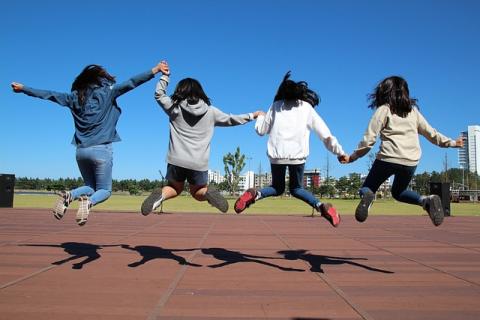Every four years, in the first year of the Olympiad, billions of people worldwide gather around TVs, mobile phones, computers, and radios to follow the Summer Olympics. Specifically, the Games of the XXXII Olympiad held in Tokyo in the second year of the Olympiad (2021) due to the pandemic were followed by 3.05 billion unique viewers. A significant number of these people do not follow any other sports event during the interval between Games. In fact, the second most-followed event in the world, the men's soccer World Cup final, falls far behind: the final of the edition held in Qatar broke all records and was followed by an astonishing 1.5 billion viewers, which, however, pales in comparison to the Olympic Games. But why does this happen? Why do so many people, who have a difficult relationship with sports, follow the Olympics with pleasure?
The Olympics humanize their athletes, avoiding the distance we are used to with men's soccer or major American leagues
A recent study has shown that watching sports competitions is associated with increased brain activity and structural volume in specific brain regions related to well-being. However, this well-being is not accessible to a significant part of the population, as mass sports do not bring enjoyment to everyone. To understand this, we must look at the social construction that surrounds them.
18 days in which we understand sports
In our daily lives, the cultural sports hegemony is marked by strong market pressures, directing it (in our immediate environment) almost exclusively towards men's soccer and, to a much lesser extent, basketball. This allows for the centralization of efforts and resources into one major product that generates significant economic benefits, disregarding and limiting the growth potential of other sports. However, taking the Paris 2024 Olympic program, the Games offer us 329 events in 45 disciplines of 32 different sports. A vast variety of types, systems, and modes of competition make it easier to find something that suits our tastes, shaped by our life experiences and cultural backgrounds.
Additionally, everything is concentrated in just 18 days. In such a framework, no sport has the capacity to dominate over the others. They are short competitions, with the longest ones (team sports like water polo) taking place in just 16 days, while many are single-day events. Following them is very easy and convenient, allowing us to connect with the competition narrative and experience it without feeling lost. This is crucial because regular sports spectacles do not facilitate following them if you're not "part of the pack," if I may say so. The Olympics, on the other hand, strive for that universal character, and that's why the International Olympic Committee (IOC) protects them above all: no sport or athlete is above the Olympic Games.
The people who narrate the Olympic Games explain the details so that anyone can understand and follow them, and they make the narration revolve almost exclusively around the sport and the athletes
This is also essential: the Olympics humanize the athletes. They avoid the distance we are used to with men's soccer or major American leagues. Olympic rules, exemplified by the Olympic Village itself, significantly reduce this inequality. In our minds, we have images of commercial stars like LeBron James, Rafael Nadal, or Michael Phelps (interestingly, all men) sitting in large dining halls with anonymous table tennis or archery athletes. This is not trivial because when the external factors, which only lead to elitism and brand image creation, are reduced, what remains is sports. Just sports. And that, as we have seen, is attractive to the general population.
Sports journalism gives its all
Journalism also plays a fundamental role in this, being an essential part of the sports phenomenon. The people narrating the Olympics are experts in these disciplines and do an exceptional job: they not only narrate the event they are broadcasting but also explain the details so anyone can understand and follow along. They are aware that the Games are a unique opportunity to attract people to the sport to which they dedicate their professional efforts and for which they feel responsible. They make the narration revolve almost exclusively around the sport and the athletes, allowing for a unique comfort for the viewers. They put in the background the usual sports information, which often seeks to provoke fan confrontations to enhance the industrial system around it. The admired Paloma del Río and her rigorous lessons in broadcasts of various disciplines, such as rhythmic and artistic gymnastics, are an example of this good practice.
We watch with excitement a 100-meter dash where it seems a world record is about to be broken, regardless of the flag, and when it happens, we shout as if it were a family member
The Games allow us to follow Olympic feats as part of the ritual. Yes, everyone follows with anticipation the athletes who fight for medals for our country. But the Olympic context allows us to live with excitement a 100-meter dash where it seems a world record is about to be broken, regardless of the flag on the athlete's chest, and when it happens, we shout as if it were a family member and marvel at the feat. This internationalist spirit is the most beautiful example of humanism that the Games give us at the start of each Olympiad. This spirit transcends borders, languages, and skin colors.
Sports humanism for everyone
The gender perspective also plays a crucial role: the Paris Olympics have achieved total parity among athletes, and considering the global framework of the Games, the number and diversity of countries and sociocultural contexts participating, this is a great achievement. The visibility of men and women in the Olympics has a parity that is not found in elite hegemonic sports, making it easier for many more people to identify with it than with traditional competitive sports, which are almost exclusively reduced to men.
The Olympic movement, with its innumerable shortcomings and defects, stems from a distinctly humanist idea: the human being as the measure of all things. Many thinkers, such as José María Cagigal, the father of Spanish sports sciences, have pointed out how the Olympic spirit has not yet been achieved due to the strong tensions arising from national interests (nationalization of the competition) and capital (commercialization of sports). Two forces that are inseparable from the Olympic movement today. However, the strength of pure sports competition, stripped of commercial interests and the cultural hegemony exerted by the major sports industries, ensures that a part of that sports humanism endures in Games that, every four years, are the only gathering place for humanity as a whole.
If you enjoy the Games and feel orphaned for four years after the flame is extinguished, sports are indeed for you; the problem is the industry that monopolizes them for the rest of the Olympiad
Therefore, if you enjoy the Games with pleasure and feel orphaned for four years when the flame is extinguished, the problem is not sports. It's not something that isn't for you. Real sports appeal to everyone because play is part of the human essence. No, sports are indeed for you. The problem is the industry that monopolizes them for the rest of the Olympiad (the time between Olympic Games). This industry, whose sole objective is economic profit, turns its back on the society's concerns, aspirations, and hopes. All for selling a jersey at €170, €185 if you want the Champions patch. Long live Olympism!





